
Betty Shitahun, 25, reflects on her journey as a deaf rights activist in Ethiopia and how she's carved out space for girls just like her with Roots and Wings ELIXIR, a Malala Fund-supported organisation.
My first memory of communicating with my parents was marked by difficulty. At the age of 4, I could no longer communicate with my parents and the world around me and that difficulty followed me to school. I couldn’t understand or communicate with my classmates, so I sat alone. Before starting school, I could speak Amharic but it wasn’t perfect, making talking to and understanding my classmates, teachers, and work assignments difficult. It took me 3 years to pass first grade. But I persisted.
My life changed when my mother sent me to a school that was aware of my special needs. There I developed my Amharic and English writing and writing. I received speech therapy from my family and school, which helped me become proficient in lip-reading and speaking. This helped me stand on my own two feet. I read different books on my own, independent of a teacher. There was no sign language and interpreter at that time and deaf children usually stay home illiterate, but I had the opportunity to be different. I wanted to be a medical doctor to cure my ear, so I selected natural science to study at university.

My deafness became a new challenge in many ways at university. I didn't attend most of the lectures because there was no interpretation. I would spend entire days at the library, studying modules myself. However, the biggest challenge was missing exams, assignments, and vital information.
Fellow students were incredibly supportive, often lending me their notebooks so I could copy down the essential material. Sometimes I approached the lecturers and told them I couldn't hear, they became nervous. They glare their eyes admiring and say "Why did you come here? You must know hearing is important. If you can't hear, you can't be a doctor." A biochemistry teacher once signed me to leave his class and told me not to come again.
So, I lost hope and spent a year at home — depressed and anxious. In 2017, I applied to transfer to Addis Ababa University to continue my education. After weeks of back and forth, I was finally admitted to the Special Needs Department and took sign language training on Saturdays and Sundays to improve my signing proficiency. I was determined to strive for my academic success to make us proud of my family and fight for the negative attitude that “a deaf can’t!”
"I am dedicated to empowering the deaf community — especially girls like me — by ensuring equal access to education, employment and public life."
During my time as a bachelor's student, I was a tutor at an orphanage in Addis Ababa. This experience allowed me to invest my time and expertise in helping children especially those with learning disabilities — sparking my interest in disability advocacy for children like me. I love exploring history books, fiction novels, and personal blogs and I wanted to pass that on to others.
“For deaf girls, like all girls, education is the key to unlocking opportunities and fostering responsible, contributing members of society.”
I enjoy visiting various primary and secondary deaf schools to share my experiences with the students and engage in open conversations. My main focus is on assisting teenagers in coping with peer pressure, building confidence, and addressing the ambiguities they face in their lives. This has become a regular practice for me, and I am currently serving as a mentor at Alpha School for the Deaf, collaborating with Roots and Wings Ethiopia.
I am dedicated to empowering the deaf community — especially girls like me — by ensuring equal access to education, employment and public life. First, we address the educational shortfall for deaf girls by converting textbooks into sign language and including video lessons for basic sign language. Additionally, we provide home-based sign language training for teachers, families, community members, local authorities and health professionals, fostering interaction between deaf girls and their family members.
For deaf girls, like all girls, education is the key to unlocking opportunities and fostering responsible, contributing members of society.
I believe my story will help educate millions of Deaf women in Ethiopia, and all over the world, who have come a long way but are still facing life challenges, based on social norms and the inability to communicate. I want to show that Deaf people can do everything. I have come a long way to arrive at this stage.
